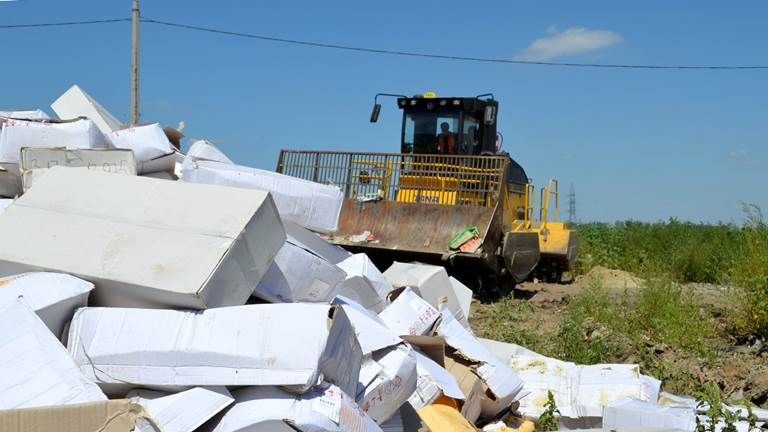Russia starts destroying smuggled Western foods
 |
| A bulldozer crushes boxes of cheese outside the Russian southern city of Belgorod, Aug 6, 2015. Russian officials began a controversial drive to destroy Western food smuggled into the crisis-hit country despite a public outcry. (Photo: AFP/Rosselkhoznadzor Belgorod) |
MOSCOW: Russian officials on Thursday (Aug 6) steamrolled tonnes of cheese, fruit and vegetables, defying public outrage to begin a controversial drive to destroy Western food smuggled into the crisis-hit country.
President Vladimir Putin last week signed a decree ordering the trashing of all food - from gourmet cheeses to fruit and vegetables - that breaches a year-old embargo on Western imports imposed in retaliation to sanctions over the Ukraine crisis.
Russian television showed officials dumping truckloads of round bright orange cheeses on a patch of wasteland and then driving over them with a steamroller in the Belgorod region bordering Ukraine. The cheeses arrived from Ukraine in unmarked boxes, but were most likely produced in the European Union, a reporter at the scene said.
A spokeswoman for the food safety agency Rosselkhoznadzor said that the flattened cheese - amounting to almost nine tonnes - would be buried.
"From today, agricultural produce, raw products and foods, which come from a country that has decided to impose economic sanctions on Russian legal entities or individuals... and which are banned from import into Russia, are due to be destroyed," the agriculture ministry said in a statement.
By the end of the day, a total of 319 tonnes of food were destroyed, including some meats from Italy which were burned in a garbage incinerator of Saint Petersburg's Pulkovo airport.
‘NOT VERY PLEASANT’
Moscow last year banned a slew of food products from the West, ranging from delicacies such as Parmesan cheese, pate and Spanish hams to staples such as apples. Food brought in for private consumption is still permitted.
Russia complains that some importers are circumventing the ban by illegally slapping on new labels that claim the food was produced in neighbouring ex-Soviet countries.
Two truckloads of European tomatoes and three of nectarines and peaches were being smashed with a tractor and bulldozer in the Smolensk region after they arrived with fake documents, the food safety agency said. One truck driver carrying a cargo of suspicious tomatoes turned his vehicle around and made a getaway back into Belarus to avoid them being destroyed, Rosselkhoznadzor said.
A source in the food safety agency warned that officials who opted to "destroy" gourmet delicacies by eating them would face criminal charges, pro-Kremlin Izvestia daily reported.
Kremlin spokesman Dmitry Peskov admitted that food destruction "visually, perhaps, is not very pleasant" but asked media not to "exaggerate the problem" because the food is "pure contraband".
‘DISPLAY OF BARBARITY’
Russia's Agriculture Minister Alexander Tkachev said the destruction was necessary because the food was of "dubious quality".
"It is a worldwide practice that if you break the law, if it is smuggled goods, they have to be destroyed," Tkachev told Russian state television.
But the decision to destroy the food has prompted a rare outburst of public ire as the economic crisis roiling the country has pushed millions of Russians into poverty and made it harder for them to afford basic foods.
"This is no ordinary measure. This is a display of barbarity, a challenge to society, a refusal to see the ethical side, where it is most important," Vedomosti business daily wrote in a front-page editorial.
On Thursday, more than 280,000 Russians had signed an online petition on website Change.org calling for seized food to be given away to the needy.
Communist Party leader Gennady Zyuganov, who normally toes the Kremlin line, said the move was "extreme" and proposed sending the food to orphanages and to the separatist pro-Russian regions of eastern Ukraine.
The first food destruction came as Russia's ruble hit 70 to the euro for the first time since March and 64.4 against the dollar for the first time since February. A recent drop in crude prices has put the ruble under renewed pressure as the Russian economy is highly dependent on oil.
The perceived absurdity of the food destruction campaign prompted an outpouring of black humour.
"'In Belgorod they have begun destroying 10 tonnes of cheese' - the news agencies are reporting it like our troops are advancing on the Second Ukrainian Front," opposition politician Alexei Navalny wrote on Twitter.
"The euro is at 70 the ruble, the dollar is at 60? Quick, let's distract them: set fire to the Parmesan!" said a tweet from an account parodying the foreign ministry, @Fake_MIDRF.
What the stars mean:
★ Poor ★ ★ Promising ★★★ Good ★★★★ Very good ★★★★★ Exceptional
Latest News
More News
- Russian President congratulates Vietnamese Party leader during phone talks (January 25, 2026 | 09:58)
- Worldwide congratulations underscore confidence in Vietnam’s 14th Party Congress (January 23, 2026 | 09:02)
- Political parties, organisations, int’l friends send congratulations to 14th National Party Congress (January 22, 2026 | 09:33)
- 14th National Party Congress: Japanese media highlight Vietnam’s growth targets (January 21, 2026 | 09:46)
- 14th National Party Congress: Driving force for Vietnam to continue renewal, innovation, breakthroughs (January 21, 2026 | 09:42)
- Vietnam remains spiritual support for progressive forces: Colombian party leader (January 21, 2026 | 08:00)
- Int'l media provides large coverage of 14th National Party Congress's first working day (January 20, 2026 | 09:09)
- Vietnamese firms win top honours at ASEAN Digital Awards (January 16, 2026 | 16:45)
- ASEAN Digital Ministers' Meeting opens in Hanoi (January 15, 2026 | 15:33)
- ASEAN economies move up the global chip value chain (December 09, 2025 | 13:32)
















 Mobile Version
Mobile Version